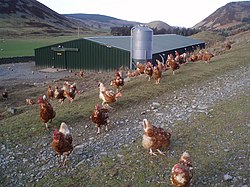


Free range denotes a method of farming husbandry where the animals can roam freely outdoors for at least part of the day, rather than being confined in an enclosure for 24 hours each day.[1] On many farms, the outdoors ranging area is fenced, thereby technically making this an enclosure, however, free range systems usually offer the opportunity for the extensive locomotion and sunlight that is otherwise prevented by indoor housing systems. Free range may apply to meat, eggs or dairy farming.
The term is used in two senses that do not overlap completely: as a farmer-centric description of husbandry methods, and as a consumer-centric description of them. There is a diet where the practitioner only eats meat from free-range sources called ethical omnivorism.
In ranching, free-range livestock are permitted to roam without being fenced in, as opposed to intensive animal farming practices such as the concentrated animal feeding operation. In many agriculture-based economies, free-range livestock are quite common.
- ^ "Dictionary definition". Retrieved 3 November 2012.